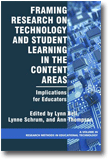
Framing Research on Technology and Student Learning in the Content Areas
Implications for Educators
Edited by:
Lynn Bell, University of Virginia
Lynne Schrum, George Mason University
Ann D. Thompson
A volume in the series: Research, Innovation & Methods in Educational Technology. Editor(s): Chrystalla Mouza, University of Delaware. Nancy C. Lavigne, University of Delaware.
Published 2008
This book is a result of collaboration between NTLS and SITTE.
Framing Research is targeted at individuals or small teams of educational researchers who are interested in conducting high quality research addressing the effects of technology-enhanced instruction on student learning. The book summarizes and unpacks the methodologies of a variety of research studies, each situated in the context of school subject areas, such as science, mathematics, social studies, and English/language arts, as well as in the contexts of reading education, special education, and early childhood learning. Taken together, the analyses provide guidance on the design of future technology research grounded in student learning of K-12 curriculum. The conclusions also serve as a tool for teacher educators seeking to prepare teachers to integrate technology effectively in their instruction and to motivate reluctant teachers to overcome perceived inconveniences connected with technology use.
CONTENTS
Preface. Introduction, Lynn Bell, Lynne Schrum, Ann Thompson, and Glen Bull. Framing the Research on Technology and Student Learning in Mathematics, Robert N. Ronau, Margaret L. Niess, Christine Browning, David Pugalee, Shannon O. Driskell and Rachel Harrington. Framing the Research on Technology and Student Learning in Science Education, John Park and David
Slykuis. Framing the Research on Technology and Student Learning in the Social Studies, David Hicks, Adam Friedman, and John Lee. Framing the Research on Technology and Student Learning in English Education During an Era of Changing Literacy Practices, Carl A. Young, Troy Hicks, and Sara B. Kajder. Framing the Research on Technology and Student Learning in Reading, Michael C. McKenna and Carrie Simkin. Framing the Research on Technology and Student Learning in Early Childhood Education, Dina Rosen, X. Christine
Wang, and Nicola Yelland. Framing the Research on Accessible Technology for Students With Mild Disabilities, Cindy L. Anderson and Kevin M. Anderson. From Teacher Preparation to Student Learning: An Example From Secondary Mathematics, Joe Garofalo, Nicole Juersivich, Jeffrey Steckroth, and Virginia Fraser. Conclusion, Debra Sprague and Melissa Pierson.
-
Paperback978-1-59311-706-1
Web price: $45.04 (Reg. 52.99)
-
Hardcover978-1-59311-707-8
Web price: $80.74 (Reg. 94.99)
- eBook9781607528685

- EDU011000 - EDUCATION: Evaluation & Assessment
- EDU037000 - EDUCATION: Research
- EDU015000 - EDUCATION: Higher
-
 Constructivist Instructional Design (C-ID)
Foundations, Models, and Examples
Constructivist Instructional Design (C-ID)
Foundations, Models, and Examples
-
 Evaluating Technology in Teacher Education
Lessons From the Preparing Tomorrow’s Teachers for Technology (PT3) Program
Evaluating Technology in Teacher Education
Lessons From the Preparing Tomorrow’s Teachers for Technology (PT3) Program
-
 Frameworks for Integrated Project-Based Instruction in STEM Disciplines
Frameworks for Integrated Project-Based Instruction in STEM Disciplines
-
 Preparing Pre-Service Teachers to Teach Computer Science
Models, Practices, and Policies
Preparing Pre-Service Teachers to Teach Computer Science
Models, Practices, and Policies
-
 Professional Development for In-Service Teachers
Research and Practices in Computing Education
Professional Development for In-Service Teachers
Research and Practices in Computing Education
-
 Research on Technology in English Education
Research on Technology in English Education
-
 Research on Technology in Social Studies Education
Research on Technology in Social Studies Education

